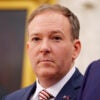Rep. French Hill, R-Ark., recently wrote an op-ed for The Wall Street Journal on House Democrats’ efforts to require the International Monetary Fund to issue special drawing rights to all member countries.
What is the agenda and goal here? “All the Third World countries that [China has] loaned money to over the last 10 years and taken strategic minerals, commodities, oil, and gas reserves as collateral suddenly have hard currency to pay them back,” Hill notes on the podcast, discussing this and more.
The Daily Signal depends on the support of readers like you. Donate now
We also cover these stories:
- The Senate holds the third day of the impeachment trial of former President Donald Trump.
- President Joe Biden makes good on his promise to halt funding for construction of the U.S.-Mexico border wall.
- Dr. Anthony Fauci, director of the National Institute of Allergy and Infectious Diseases and chief medical adviser to Biden, predicts the coronavirus vaccine will be available to everyone by April.
“The Daily Signal Podcast” is available on Ricochet, Apple Podcasts, Pippa, Google Play, and Stitcher. All of our podcasts can be found at DailySignal.com/podcasts. If you like what you hear, please leave a review. You also can write to us at letters@dailysignal.com.
Rachel del Guidice: I’m joined today on “The Daily Signal Podcast” by Congressman French Hill of Arkansas. Congressman Hill, It’s great to have you back on “The Daily Signal Podcast.”
Rep. French Hill: Rachel, it’s great to be with you. Thanks.
Del Guidice: Well, thank you again for being with us. It’s great having you.
You just wrote an op-ed for The Wall Street Journal on House Democrats and their efforts to require the International Monetary Fund to issue special drawing rights to all member countries.
Before we get more in-depth on this, can you just tell our listeners about what the International Monetary Fund is and what its function is?
Hill: You bet. After World War II, the International Monetary Fund is one of those multilateral vehicles that was created for primarily taking money from wealthy countries and making sure there’s an effort to help countries get through tough times in a foreign exchange challenge.
When a country has got too much debt or it needs to work through a short-term, repeat, short-term kind of financial struggle in their country, the IMF can loan them short-term money to help them get through a tough time.
Democrats in Congress are proposing that the IMF extend narrowly $3 trillion in hard currency to all 190 countries that are part of the IMF in the name of fighting the pandemic.
Republicans just absolutely disagree with that. Both the World Bank and the IMF have other ways they can help poor countries [struggling] with fighting COVID-19.
Del Guidice: That was actually one of my follow-up questions. What is the agenda here, to shower all this money on these developing countries? Why is there all of a sudden this urge to do this when that’s not the job of the institution to begin with?
Hill: Well, taking the best-case scenario, Rachel, it’s wealthy countries wanting to help the poor, struggling countries with too much debt meet their budgetary needs, and the short one, to fight COVID-19 and get their economy open.
Of course, that’s taking the positive side, but I find it ironic that China is the biggest suggester that this needs to be done. The governor of the Chinese central bank has been championing this issue.
Of course, China is a large creditor country, doesn’t need money, and yet they would get almost $200 billion from this process.
And more importantly to China, all the Third World countries that they’ve loaned money to over the last 10 years and taken strategic minerals, commodities, oil, and gas reserves as collateral suddenly have hard currency to pay them back.
In my view, a more pernicious issue is that China is lobbying for this because they stand to benefit. … Also, part of that hard currency basket is the Chinese currency. This is a way for them to extend even more of their currency around the world in bank accounts.
Del Guidice: Another point you make in the op-ed is that congressional Democrats are pushing for special drawing rights. Can you talk a little bit about why they’re doing that as well as just explain briefly what these special drawing rights are?
Hill: Special drawing rights are … a very blunt instrument. It allows the IMF to provide hard currency to its member countries, but it cannot distinguish between a rich country, like the United States or the Netherlands, and a poor country, like Nigeria or the Congo.
It cannot distinguish between democracy-loving countries with free market capitalism that are doing well and tackling the virus and authoritarian dictatorships that are centers of terrorism.
This bill, if the Democrats got their way, would give billions of dollars to Iran; Syria, the Assad regime in Syria; [and] Venezuela, the Maduro regime.
So, it’s a way to get hard currency in the hands of countries, but it’s a blunt instrument. It has to be given to all the countries on the same basis. I think that’s another reason why it absolutely should not be pursued by the Congress.
Del Guidice: As you just mentioned, and you point out in the op-ed, this plan from the Democrats would send about $20 billion of special drawing rights to Iran and another $75 billion would go to the Kremlin.
I just want to hear about why are Democrats so intent on giving money to places like Iran, where they’re like a known enemy? Is there a hidden agenda here? To put it bluntly, what is their strategy?
Hill: I think it’s a combination of naivete. I’m not sure all the Democrats even know what this policy actually does or how it actually works.
I hate to say that, but that’s my view because, as you know, a concern over state sponsors of terrorism like Iran and the Assad regime, for example, Russia, have not been supported by a strong bipartisan majority in the Congress.
I think part of it is, I’m not sure they understand what their policy is that they’re advocating. If they truly want to help poor, impoverished countries get back on their feet after COVID-19, there are two ways to do that.
First of all, David Malpass, who runs the World Bank, has a loan program for poor countries that is helping them get vaccine distribution and long-term development loans to help them get through the COVID-19 economic challenges.
Secondly, the IMF has two small funds that already exist … that are for short-term emergency purposes to help countries get through this kind of a catastrophe.
The only alternative motives that I’ve come up with that’s concerning to me is that the lead advocate outside the IMF and outside the Democratic Party to do this is China.
Del Guidice: How do you expect the Biden administration to respond to these requests and even lobbying from Democrats for these special drawing rights? What do you foresee happening?
Hill: Well, during the calendar year 2020, Democrats in the House and Senate attempted to put forward this policy through the National Defense Authorization [Act], through the omnibus spending bills, and we were able to stop it because the Trump Treasury opposed this approach, and as I say, I’ve led an effort on Capitol Hill to oppose it.
So, we are going to press the Biden administration and … Secretary of Treasury [Janet] Yellen to oppose the special drawing rights approach of Democrats, and in turn support the targeted, already authorized efforts—both at the World Bank and at the IMF—to help our poor countries get back on their feet.
Del Guidice: Looking at this from more of a thousand-foot angle overall, … Democrats’ efforts to require the International Monetary Fund to issue these special drawing rights to these member countries, how would that do more harm than good overall to the global economy, if you’re just looking at this from a very big, wide angle?
Hill: I think on the wide angle, two issues. One, it can’t be targeted. So, you’re injecting into the world economy about $3 trillion in hard currency that goes, as I say, to both rich countries—like the United States, China, the Netherlands, the United Kingdom—as well as poor countries, and those who are state sponsors of terrorism.
So, you’re putting hard currency out in the hands of a lot of countries who don’t need it. Therefore, that could be a very inflationary signal in the global economy as the economy recovers and vaccines are extended around the world.
Lack of targeting, a tremendous injection of liquidity, as I say, … it’s going to people that don’t need an injection of liquidity, which could be a major contributor to a global inflation.
Del Guidice: Lastly, Congressman Hill, what would your message be to … colleagues in the House who are on the fence about this, and maybe they still haven’t made up their minds about how they’re going to go forward with this? What would your message be to them?
Hill: My message would be, like in any of our fights against COVID-19 and reopening our economy, both here at home and around the world, we want strategic targeted relief, not across the board, one-size-fits all, inappropriate, just sheer money spending.
My thought and my suggestion to my colleagues on both sides of the Hill is to support David Malpass’ efforts to get vaccines out to the countries through the World Bank, and to use the International Monetary Fund, the IMF, use their small trust funds that will help the most hard-hit countries in the Third World and get them the resources they need to recover.
Del Guidice: Congressman Hill, thank you so much for joining us on “The Daily Signal Podcast.” It’s always great having you with us.
Hill: Rachel, it’s always great to be with you. Looking forward to seeing you soon in person.





























